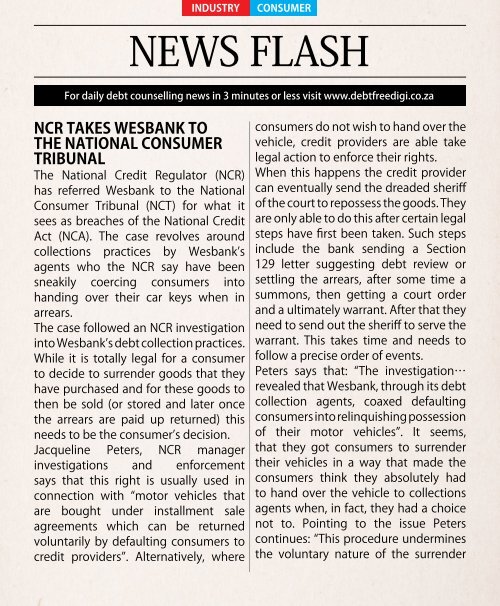Debtfree Magazine March 2017
The March 2017 issue of Debtfree Magazine. We discuss if it is possible to have fun while under debt review. We also have articles, news, advice, tips and more.
The March 2017 issue of Debtfree Magazine. We discuss if it is possible to have fun while under debt review. We also have articles, news, advice, tips and more.
Create successful ePaper yourself
Turn your PDF publications into a flip-book with our unique Google optimized e-Paper software.
INDUSTRY<br />
CONSUMER<br />
NEWS FLASH<br />
For daily debt counselling news in 3 minutes or less visit www.debtfreedigi.co.za<br />
NCR Takes Wesbank to<br />
the National Consumer<br />
Tribunal<br />
The National Credit Regulator (NCR)<br />
has referred Wesbank to the National<br />
Consumer Tribunal (NCT) for what it<br />
sees as breaches of the National Credit<br />
Act (NCA). The case revolves around<br />
collections practices by Wesbank’s<br />
agents who the NCR say have been<br />
sneakily coercing consumers into<br />
handing over their car keys when in<br />
arrears.<br />
The case followed an NCR investigation<br />
into Wesbank’s debt collection practices.<br />
While it is totally legal for a consumer<br />
to decide to surrender goods that they<br />
have purchased and for these goods to<br />
then be sold (or stored and later once<br />
the arrears are paid up returned) this<br />
needs to be the consumer’s decision.<br />
Jacqueline Peters, NCR manager<br />
investigations and enforcement<br />
says that this right is usually used in<br />
connection with “motor vehicles that<br />
are bought under installment sale<br />
agreements which can be returned<br />
voluntarily by defaulting consumers to<br />
credit providers”. Alternatively, where<br />
consumers do not wish to hand over the<br />
vehicle, credit providers are able take<br />
legal action to enforce their rights.<br />
When this happens the credit provider<br />
can eventually send the dreaded sheriff<br />
of the court to repossess the goods. They<br />
are only able to do this after certain legal<br />
steps have first been taken. Such steps<br />
include the bank sending a Section<br />
129 letter suggesting debt review or<br />
settling the arrears, after some time a<br />
summons, then getting a court order<br />
and a ultimately warrant. After that they<br />
need to send out the sheriff to serve the<br />
warrant. This takes time and needs to<br />
follow a precise order of events.<br />
Peters says that: “The investigation…<br />
revealed that Wesbank, through its debt<br />
collection agents, coaxed defaulting<br />
consumers into relinquishing possession<br />
of their motor vehicles”. It seems,<br />
that they got consumers to surrender<br />
their vehicles in a way that made the<br />
consumers think they absolutely had<br />
to hand over the vehicle to collections<br />
agents when, in fact, they had a choice<br />
not to. Pointing to the issue Peters<br />
continues: “This procedure undermines<br />
the voluntary nature of the surrender


















